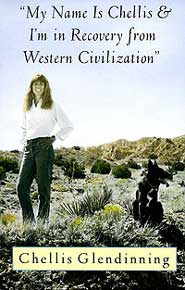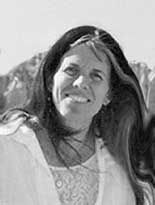|
from september 2001 blue vol II. | ||
| Book Notes | ||
|
& I'm in Recovery from Western Civilization by Chellis Glendinning
The goal of development, according to Psychology, is to create boundaries, to encase things. [26] The encapsulated individual. To nature-based person, individual consciousness does not exist. The unit of wholeness is the universe - soul of the world. [30] Among aboriginals, each participates fully in the group. Nearly everyone is an expert, or at least competent, in all of the skills that the group performs. [38] Aboriginals are actively engaged, complete people. [39] Each abo in the group has a voice in decision-making. Small groups allow the continuous involvement of each member.[40] Each dispute is settled as it arises, and the responsibility for doing this falls on the entire group. [40] Abo kids of 10 or 12 can join another group if they dislike a decision, or they can live on their own in the woods. They have incredible freedom, so no rebellion or power games. Hierarchy is not needed. [42] Some groups have no chiefs, councils, juries, or courts. Chiefs were chiefs as long as they were respected. People didn't turn their power over to them. Equality of sexes. Abundant leisure time. Good nutrition. Stable population. Ecological sustainability. [43-52] Trauma of domestication. First mental hospital in the 17th century. Breaking world into tame vs. wild shattered the world. The fence was the dividing line. Abusive behaviors, directed at self or others, are not normal human behaviors. People become abusive because something unnatural has happened to them, and they have become damaged. [59-63] Domestication separated us from full participation with the natural world, and became the original trauma. We can go a week or month without smelling a tree, seeing the moon, meeting an animal in the wild. Original trauma is disorientation, psychic displacement, our exile, our homelessness. [64] Negative effects of trauma passed on from person to person, generation to generation, culture to culture. Abusive behaviors replicate through family lines. Effects of witch hunts are still with us. Since end of war, three times as many Viet Nam vets have died from suicide as from combat. How did dads who killed Indians or enslaved blacks treat their kids? How did German family relations pave the way for Nazis? [65-68] First crops Agriculture was the "great leap backward." or, worst mistake in human history. [69] Wild animals are not manageable, and must be "broken." Off with the gonads. To abos, animals "were seen as belonging to their own nation and to be the bearers of messages and gifts of meat from a sacred domain." Freud's castration anxiety, traumas of circumcision, leads to rape, S&M, & sexual violence.[80] In our civilization, trauma is process is constant and chronic. We have lost tools and methods for healing ourselves. RD Laing: our "socially shared hallucinations, our collusive madness is what we call sanity." Millions share the same mental pathology. We are hyperactive, jumpy, anxious, and paranoid. Traumas come back to haunt us via dreams, recollections, nightmares. We have psychic numbing, constriction of feeling. Sense of powerlessness and futurelessness, surrender patterns. One can do nothing to stop the madness. We make ourselves small, and hide. [88-92] Arrested genetic and/or psychosocial development. Traumas truncate development process. Narcissism: all related to self is fully real, while everybody and everything else is not interesting, not fully real. We are a "plethora of raving egoists." Three universal urges are frustrated: community, engagement, and shared responsibility and interdependence. [93-94] Thinking disorders. In full defense mode, encapsulated, we do not think clearly. [95] Trauma's primary effect is dissociation. We play dead, split our consciousness, remove suffering from awareness, go numb, play dead in mind, body, and soul. [109] Domestication led to most later evils: colonialism, industry, etc. [117] New Age: you are what you think. "Such postmodern thinking reflects both the detachment, hubris, and fragmentation of the technological mind-set and the denial, grandiosity, and dissociation of the traumatized personality - which are, in the end, the same." Extreme, absolute, ungrounded cultural relativity: There is no primal matrix to listen to, no Earth to care about, no interconnectedness among people, no relation of humans to world, no morality.[121] Every trauma is both individual and social and historic. Today's techno society is "a collective reflection of the traumatized personality." Trauma recovery in stages. First is release of amnesia, denial, and dissociation - allowing conscious remembrance. People seek instant completion. Trauma victims are utterly powerless. [126] Jung saw universal mandala symbol. Humans have basic urge for completion. Abos mend psychic problems, by creating and recreating connectedness with ceremonies and healing practices. Western civ. addresses severance by covering it up, dramatizing it, acting it out, making it worse... [134-135] People need sense of safety to heal. Safety is first victim of domestication. 138 Acknowledging the problem constitutes a giant leap for forging a safe place. The inner witness is bigger than the problem, and not identified with it, and so can provide safety. The wise one within. [137] We each, in communion with the natural world, have been called as warriors to bring our talents, strengths, and caring to this moment of history. [142] As we heal, we come into wholeness. Domestication knows no wholeness. [150] Merwin Day, Australian abo: "The future is broken." [159] We are a part of the organism of the world. The personal is planetary, and the planetary is personal. If we don't recognize this, we become paralyzed. Abos have no concept of a separate psyche. There is no such thing as the unconscious. There is no projection, no abstracted symbology, no distinction between thought and feeling. If a !Kung has a problem, it is not their problem, it is a sign of a problem in the community or the cosmos. All night dances adjust and maintain right relations with the forces of nature, which often brings about healing. [162-163] We must separate our psyches from dysfunction's, one by one, both inner ones and outer ones. As we heal, we become more resourceful and creative in our responses to life. There are many huge external traumas, and each must be made conscious and addressed. N.A. introductions: land, way of life, spirituality. "Now I want to know whom I'm talking to, and I'm not going to say anything of substance until I know who you are. And don't tell me which books you have written, and don't tell me which organizations you belong to. Tell me who you really are." [165-167] "Our loss of an intimate relationship with nature is not the only cultural loss we sustain. The social qualities that indigenous communities assume remain elusive as well. The sense of participation in our lives and destinies that is built into nature-based reality - this we do not have. If we come to know dignity as women and men at all, it is hard won. We have little time to relax and be mindful.... The cultural avenues for developing into full human beings are lost to us as well." [168] No trust in each other and the world. We don't develop true centeredness, we erect psychic boundaries. We have many losses to name, and many losses to grieve. [170] Pain in modern life is so intense that we tend to repress it. Feeling the pain and knowing its source is a crucial part of the healing loop. To feel our pain is to come alive. Natives laugh at us: Oh wow! I just realized that the river is sacred. "So what? What new thing did you learn?" When we begin to heal our traumas of western civ, something miraculous (i.e., entirely ordinary) happens to us: the resources of the primal matrix return to us. Many psychologists try to adjust us to society as it is. [174-175] "Western civilization had robbed me of the central experience human beings have shared for 99 percent of our time on this Earth." We can't use European spirituality. "To create an authentic Earth-based culture, we must communicate with the rocks and trees and birds here, now." [176] Learn the ways of gathering, and relate to this land I call home as if I were responsible for building the culture that the rocks and trees and birds of this place expect of human beings. The potential to know Earth wisdom and to live well upon the Earth lies within every one of us. The more uncertain I have felt about myself, the more there has grown up in me a feeling of kinship with all things. [180-181] With recovery comes increased clarity in defining needs and setting limits; more confidence; dreams indicating psychic integration; and most especially, a sense of well-being that, allowing for momentary downfalls and challenges, becomes chronic. You begin to be able to be the deer; you move like a deer, and you open to the brilliance of what life is all about. [184-185] "Recovery is based on the empowerment of the survivor and the creation of new connections" - Judith Herman. [187] Our lives upon this Earth are part of a vast, magnificent, and unfathomable whole. When the patterns of livelihood connecting our nomadic ancestors to the web of life were broken in one seemingly minor way - domestication - the whole was shattered into a thousand fragments. [204] Authentic recovery from western civilization must include every fragment of our collective shattering - not just our self-esteem and where we dump the garbage, but how we structure our communities, how we speak and make decisions, what artifacts we create and who creates them, what we eat, how we dream, who we think we are, how we relate to the mountain of our ancestors, how we bring our children into the world, and how all these facets of our life fit together. Human's job on Earth is to praise Creation (N.A. story). NA religion was all about thanking the creator. "We thank Him for everything that exists. We don't take it for granted that a tree's just there. We thank the creator for that tree. If we don't thank Him, maybe the Creator will take that tree away. We pray for the harmony of the whole world. If we don't, the world will come to an end. [212] - Richard Reese
Areas of Expertise: community visioning; cultural preservation; environmental justice; public
education; voluntary simplicity Role Description: community activist & member; scholar/teacher
Personal Information: I live in an indigenous Chicano village which was sustainable up until
a generation and a half ago. While the technologies & mind set (& drug addictions) of mass technological
utilization are quickly arriving here, there is a marvelous anachronistic dedication to preserving the old
ways. People here dig the acequia (natural irrigation system); gather medicines; grow chile, squash, corn,
wheat, alfalfa; ride horses; fish; raise sheep; weave; do tinwork & woodcarving; and speak a
combination of Castellan Spanish, Nahath (Aztec), and Tewa. I participate in many of these activities
with gusto. I am an author, lecturer, and psychologist. I am a leader in the contemporary technology-criticism
movement (neo-Luddite) and (the other side of the coin) in the development of the new field of
eco-psychology. My prime role is as an educator, social thinker, and consciousness-raiser.
Publications: When Technology Wounds: The Human Consequences of Progress
(NY: William Monrow, 1990) -- available via Ned Ludd Books: (505)867-0878. |
||


 Brief biography of Glendinning:
Brief biography of Glendinning: